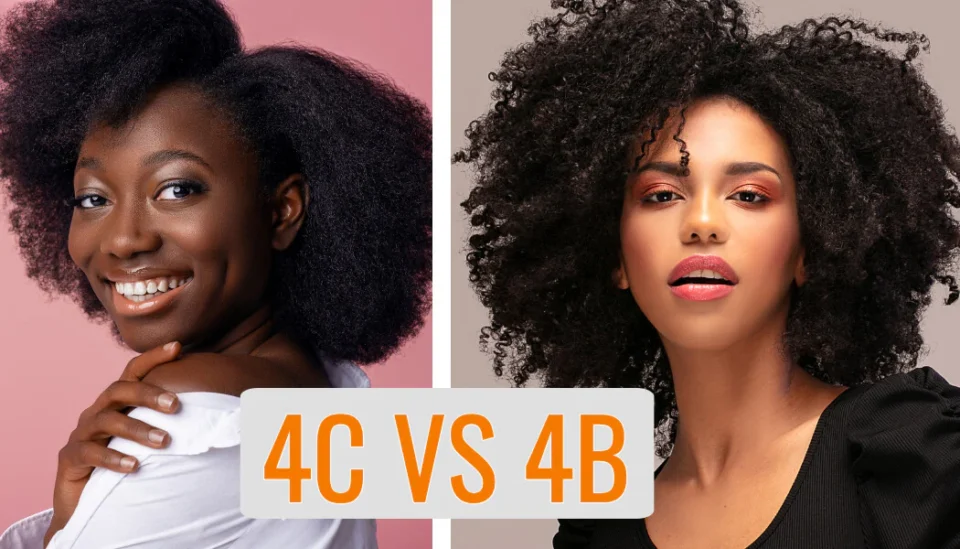For many with natural hair, the journey to embracing 4B and 4C hair textures can be a path of both discovery and self-love.
These tightly coiled curls are often misunderstood and require a unique approach to care and styling. But once you get to know your hair and its needs, you’ll see just how versatile and beautiful it is.

READ ALSO: 5 Best Black Hair Salons in Las Vegas Nevada
Table of Contents
READ ALSO: 5 Remarkable Actresses With Grey Hair
What is 4B and 4C Hair?
Both 4B and 4C hair fall under the Type 4 category, known for its tight curls and coils. However, there are key differences between the two.
- 4B hair: This texture features tight, zig-zagged curls that don’t have a defined curl pattern like 4A hair. It’s typically dense and fluffy, often appearing thicker.
- 4C hair: Similar to 4B but with even tighter coils, 4C hair is more prone to shrinkage (sometimes up to 75% of its actual length). It has a lack of defined curl patterns, and often requires a bit more moisture and care to stay hydrated and healthy.
READ ALSO: Discovering 4 Atlanta Black Hair Salons: Expert Styling, Care, and Community
The Importance of Moisture
One of the most essential steps in maintaining 4B and 4C hair is keeping it hydrated.
These hair types are prone to dryness because the natural oils from the scalp struggle to travel down the tightly coiled strands.
Moisture becomes the key to defining curls, reducing breakage, and promoting growth.
Using a leave-in conditioner after washing, such as SheaMoisture Jamaican Black Castor Oil Leave-In, can help restore hydration and softness.
For those with low-porosity hair, a lighter formula that doesn’t weigh down the strands can make all the difference.
You might want to reach for a water-based option, like Cantu Shea Butter Moisturizing Curl Activator Cream, which helps in maintaining moisture without the heaviness.
READ ALSO: Finding the Best Hair Cream for Black Hair: 4 Top Choices for Moisture, Strength, and Definition
Detangling with Care
Because 4B and 4C hair can easily become tangled, detangling must be done gently and with the right tools.
Opt for a wide-tooth comb or, even better, use your fingers to detangle when your hair is wet and coated in conditioner.
Products like Aunt Jackie’s Knot On My Watch Detangler offer great slip, making it easier to work through knots and tangles without pulling or breaking the hair.
Styling and Protecting
When it comes to styling, protective styles like braids, twists, and bantu knots are fantastic ways to retain length and reduce manipulation.
These styles allow your hair to rest and grow while looking stylish.
Before putting your hair into any protective style, it’s important to seal in moisture to prevent your hair from drying out.
A sealant, such as TGIN Butter Cream Daily Moisturizer, works wonders to lock in moisture.
Additionally, applying a light oil, like jojoba oil or argan oil, can add shine while also offering another layer of protection against moisture loss.
Many naturals with 4B and 4C hair also swear by the LOC method (Leave-In, Oil, Cream) to keep their strands soft and hydrated over time.
Dealing with Shrinkage
Shrinkage is a natural part of the 4B and 4C experience. While some embrace it, others look for ways to stretch their hair.
If you want to show off more of your length, techniques like twist-outs, braid-outs, or banding can help elongate your curls.
When styling, using a product like Camille Rose Almond Jai Twisting Butter adds moisture while helping to define curls without leaving your hair feeling stiff.
Heat can also be used to stretch 4B and 4C hair, but it should be done sparingly to avoid heat damage.
If you decide to use heat, a good heat protectant, such as Mielle Organics Mongongo Oil Thermal & Heat Protectant Spray, is essential to shield your strands from damage.
Photo credits: Ballice Mink Hair Vendor